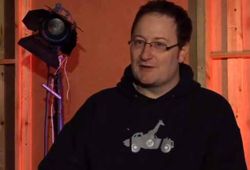 Chris Chibnall was the only writer other than the show’s creators to write for both series of the BAFTA and double International Emmy award-winning BBC One police drama “Life on Mars” (2006–2007).
Chris Chibnall was the only writer other than the show’s creators to write for both series of the BAFTA and double International Emmy award-winning BBC One police drama “Life on Mars” (2006–2007).
In 2005, Chibnall became head writer and co-producer of science-fiction drama “Torchwood.” The series, a spin-off from the long-running “Doctor Who,” premiered on BBC Three in October 2006 to a then record-breaking audience for a digital channel in the UK. The series went on to win “Best New Drama” at the 2007 TV Quick Awards and “Best Drama Series” at the BAFTA Cymru 2007 awards. Chibnall wrote eight episodes during the first two seasons, including both series finales, and the premiere episode of season two, working closely with Russell T Davies across all aspects of the show’s production.
While working on “Torchwood,” Chibnall also penned the 2007 episode “42” for the third season of “Doctor Who.” The series won the Writers Guild of Great Britain award for Best Series that year. He subsequently wrote the two-part story “The Hungry Earth” and “Cold Blood” for the 2010 season. In 2007, Dick Wolf and Kudos Film and Television selected Chibnall as the launch show runner on ITV1’s “Law & Order: UK,” setting up the UK police procedural/legal drama based on the original U.S. series.
Chibnall has also written an original feature screenplay “United” for the BBC, about Manchester United and the 1958 Munich Air Disaster, which will star David Tennant and Dougray Scott.
Camelot airs every Friday on Starz at 10:00 pm Eastern Standard Time, Pacific Standard Time.
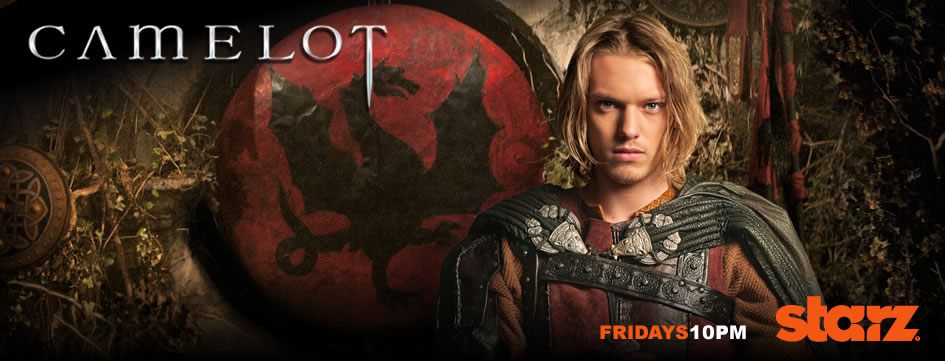
What was it about this material that really appealed to you?
Chris Chibnall: I think growing up as a Brit Arthur and Merlin and Camelot and the idea of it is just embedded in the culture and kind of in your souls growing up. The King Arthur and – is alongside Robin hood as those kind of great British folktales and myths and icons. And you go and visit Tintagel and all these kind of great sites. So it’s a once in a generation chance to tell that story for a new audience and to kind of refresh it and give a kind of version of it. So it’s one of the great myths. It was an absolute no-brainer to do and to tell. And the joy of doing it is it’s kind of infinite in its possibilities so for a writer is a real joy and a gift.
What was your approach to Camelot?
Chris Chibnall: First of all I had to approach it and in the sense of take nothing for granted, you know. There have been so many different versions of the legend and of Camelot. So what I wanted to do is strip it all back and sort of go back to the beginning and tell the story of Arthur from the beginning of the relationship between Merlin and Arthur from its very first meeting and also then really that where Tamsin just used of trying to make it feel real and basically looking at, going back to the source material of Mallory’s more darker which is kind of the most complete version of the myth in many ways and going well here are the events and here are the stories that we know. But what might it have been like if you lived through them? If you kind of take it for granted that this – all this stuff happened, how would it be to be Arthur and be 19 and just be, you know, quite happy and comfortable in your life and then this mad shaven-headed man turns up at your house and says oh you’re adopted and by the way you’re the king, you know, and come with me halfway across the country. We got to sort out some war lords, really looking for the emotional truth in everything. And that’s the way I kind of approached it. And from then on you just start to ask questions. You don’t want to go with the received images. So the conversations that Joe and I had were absolutely not going for the kind of stalk and received way of betraying Merlin but more about asking what does he want? Why is he so keen for Arthur to get to the throne? What is he seeing and then taking that for example into the (mantic) and going what will it be like to have those powers because nothing really in like comes without a cost and nothing comes without consequences. So I think the big thing was making sure that the show was full of character, full of emotion and also that every decision and every action had costs and consequences and then it could start to feel emotionally resident to now. So that was the big thing and also to have fun as well. We had to have a laugh doing it. As a writer and show runner you’re not just kind of creating a set of characters and putting them down in the modern world. You’re world building. And I think particularly with this where it is in the history it is absolutely myth. There might have been an (Nupha). There might have been an Arthur. There’s various interpretations of history. But the myth that we’re telling here with Merlin and all that, it’s so open to be manipulated and created. So yes, you’re building this whole huge world of castles and sword fights. And then you can have some magic and it’s fantastic, yeah and absolutely wonderful. But also then we wanted to place it within a real context so there’s a real – did a lot of research about the period when it is set. And we have an idea of kind of when that is. But it’s also the great thing about the dark ages is there’s very little documentation available. There’s very little evidence. There’s a certain amount but some of it’s contradictory. A lot of it’s contradictory. So, it’s joy doing something in a different era.
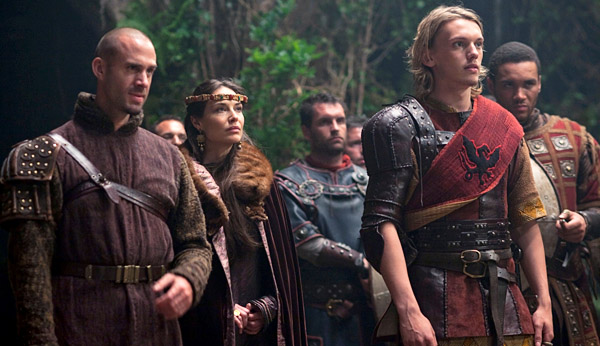
What surprised you as Camelot developed?
Chris Chibnall: The moment – I think what surprised me was and what kind of delighted me was the level of cast we managed to bring in and to get to commit to the show. And then I think once you’ve got actors of this caliber in place and it’s the joy of a series is it becomes a dialogue. So you’re putting stuff down and then you’re seeing, you’re discussing it in rehearsal but then you’re also seeing what comes through in the dailies in the rushes. And you’re molding and shaping the characters as you go along. And it becomes a response to what’s on screen. So I think the characters take very interesting developments and you refine them and they take interesting turns because you see a little emphasis in a performance in a particular scene and you think oh there’s a whole facet and a whole emotional storyline there I want to follow. So that was probably the biggest thing. And that was the delight of it to be honest.
All the epics and classics are being transformed into stronger and more unpredictable stories. How different is Camelot from the original story and what changes have you made to suit the 21st Century audience?
Chris Chibnall: Well there’s so many different versions of the myth. You know, there really isn’t that one definitive version of the story. And that’s the kind of joy of myth in a way is it’s re-invented every generation to resonate with the concerns of that particular generation of people. So the thing that I kind of focused on really was making sure that everything we did and every decision we made was emotionally motivated. So what I did with these first ten you’re talking about the foundations of Camelot. You’re talking about how are Arthur and Merlin, everyone bring in all the components that they’re going to need. So really it was a question of I think for me what was interesting and what made it relevant was like well how on earth do you become a ruler and how do you, you know, what do you promise as a ruler? And if you’re a leader and you’re out there promising hope, how do you then deliver on that promise? How do you bring something as abstract as hope into existence and deliver it for people? So it’s not hard to find modern resonances and relevancies. It’s all there in the great material. But you just choose what to emphasize. And for me it was about making kind of credible characters that you could relate to that didn’t feel like they were behind a guise which sometimes you get (into) your drama if it’s slightly removed from modern life. I wanted it to feel very immediate and very fresh and very dynamic. And I guess in terms of the narrative, the sort of the big decision really was ensuring – well I mean every decision tweaks it to be honest making Merlin a very clear king maker and more of a spin doctor than an out and out as Joe said we ditched the pointy hat and the cloak and the staff and the beard in our very first discussion. And so Merlin is much more of a Donald Rumsfeld Karl Rove type character which changes the emphasis of things immediately. But I think the story in this first then of the parallels between between Arthur and Morgan really it’s a tale of two houses, a brother and a half sister who both want the crown, both have equal legitimacy to it and how they go about trying to get it. That was where we found the emphasis for this first batch. You’re always looking for the big residencies. And I think Rumsfeld was such a pervasive figure all across the world that he was one of the references that Joe and I talked about right from the start. And when I pitched the show to Starz and to Chris Albrecht early on we talked about leaders who promise hope and then how difficult that is to deliver on a daily basis. And it’s the residencies there are really clear and I think it’s the great thing again about myth is hopefully if you know there are certain preoccupations that every era has. And hopefully we’re tapping into things that are going on at the moment in terms of fractional countries, in terms of leaders promises, in terms of the complexity and duality of how you rule and the morality of how you rule. So you just hope that those themes will resonate with an audience throughout. And I think I’ve been really lucky on the show. I think the more specific you make things the better they travel funny enough. I mean you guys are just about to get The Killing on AMC which we’ve had over here on the BBC the actual original Danish version. And I’m absolutely addicted to it. And I think you do your best to kind of tell your own story in the most specific way and then you hope that that travels and storytelling and particular myths hopefully travels well when it’s done with kind of heart and honesty.
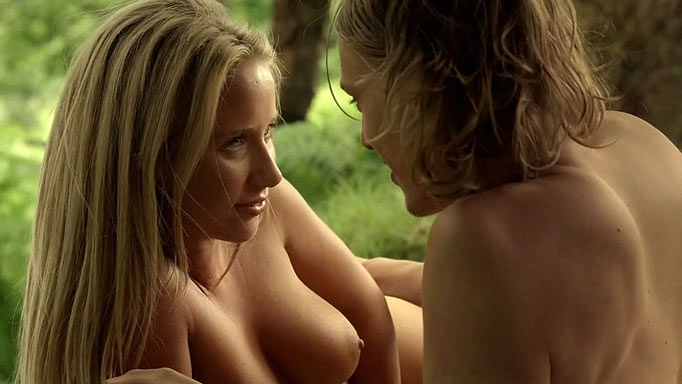
Starz is known for doing more realistic portrayals showing the sex and the violence and all that. How far do you go and does it free you as a writer to fully develop your work?
Chris Chibnall: You all talked about being actors and having sex on set. I think as a writer what’s great and what’s key to Camelot is it’s a story about passion in both the personal and the political. So, the political aims are brought down by personal passions all the way through the myth. And what’s great is we’re able to show that. And, I don’t ever want to be gratuitous for the sake of being gratuities but when it serves the stories and serves the characters it’s nice to be able to do that realistically and with credibility. And so you don’t want to do it for the sake of it. And you don’t want to shoehorn it in. But it’s a great – it’s another good tool to have in the toolbox he says worried about his metaphors.
Is Merlin getting any?
Chris Chibnall: Well I think what Merlin’s getting and I think what the audience is getting is rather than heads rolling and bottoms going up and down which actually quite frankly we’ve seen day in, day out and there’s not much reinvention on that regard. But I think the reinvention and in particular in Camelot is the sense that we’re showing what everyone knows is an age of chivalry and knights and honor. But we’re showing the people who are famous and icons in this regard. We’re showing them warts and all. And I think that’s the true gutsy reality. I think that’s what makes is modern and stark is that we’re being revealed these wonderful characters, these heroic characters. But we’re being shown all their doubts and faults and warts and nasty sides. And I think that’s what really much more engaging than just a sort of the rump or the violence. And I think that’s really what underpinned it is the fact that you have a king which would jump into bed with someone that’s betrayer to someone else or you have Merlin who is taking a mother’s child one or two days old and whipping it from her arms barely out of her womb and then stealing this boy to become a future king, you know, with no sort of warning until the sort of the day has come. So there’s these star kind of revelations. And I think well people then really know. And if they do it’s kind of – it’s reminded in a really vivid sense. So that to me is where it becomes as an actor, more engaging and more modern and real is that we’re getting to see their faults and their true human conditions of these mythological icons and they’re being brought back to us in a very vivid real sense.
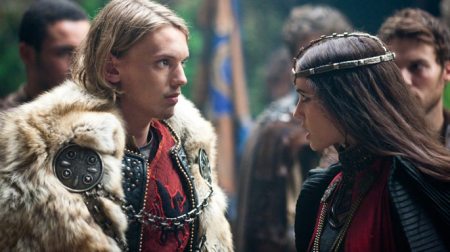
What kind of pace is the story going over the ten episodes?
Chris Chibnall: Well I think one of the key things we wanted to do in the first season was really set the foundations. There’s no rush with the story. And it was one of the things that when I first spoke to Chris Albrecht at Starz about it, is one of the things he was very strong about, he said, take your time, don’t rush. We’ve got time. And really what he wanted to see was how all these characters come into this world. So that was a great kind of permission from the boss to really spend time with people. So as I say, you’ll see a lot of the iconography this year. You’ll see the Lady in the Lake. You’ll see the Sword in the Stone. You’ll see the very, very beginnings of a round table right to the end. But this is about this ten is really about bringing together the group of people and the building and some of the artifacts of what will become the legendary Camelot. It’s not really didn’t want to come in with Camelot as a great glittering golden place in it’s prompt, wanted to – the three for me was telling the story of how Camelot is built and earned and achieved through blood and sweat and tears and a lot of mud.